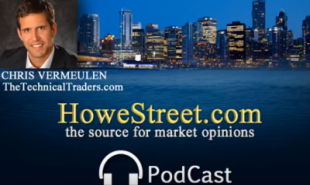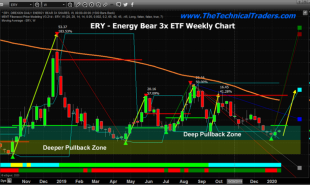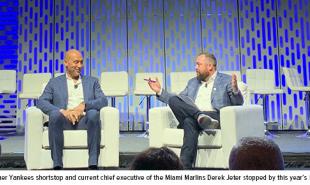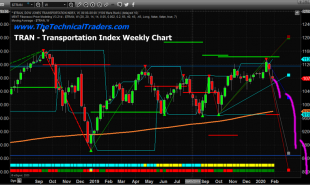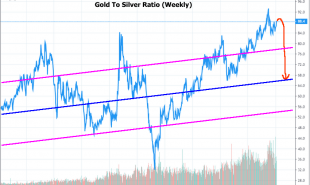
Amazon Poses A Serious Threat To Freedom And Free Markets

The “Grater” Evil
Politicians are stupid on top of being greedy. And smart businesses have been playing them for fools for ever. Banks wrote their own rules for government to impose, Elon Musk took billions of taxpayer dollars and they got a 3% return while he made a bit more.
Tesla needed $500MM to get started in 2008. The US Government lent $465MM to Tesla at 3% interest under its push for Green Energy. Elon Musk lent the company $38MM at10% interest plus stock options. Here are the profits on those loans:
- Elon Musk’s $38MM generates profit of $1.4BB, or 3,600% ROR- a VC payout
- Taxpayers’ $465MM- generates profits of $12MM or 2.6%ROR- not a VC Payout
Taxpayers took VC risk without VC returns. The table is set for Elon to arbitrage the Government’s largesse much more. All in, the US Government committed about $4.9BB to finance Tesla’s operations
Full story on how Elon Musk Played a Broken System here.
And so it goes. The only people more gullible than politicians are the people who vote for and empower them.
Enter Amazon.
Amazon is now in the state tax collecting business. Early investigative research conveys that Amazon is partnering with states to collect taxes for sales in particular states.
If our research bears out, that means Amazon is in partnership with local govt, and local govt has privatized tax collection.
For now: price a pair of Zappos sneakers on Amazon. Then price them on Zappos website. Assuming you do not live in the state Zappos operates, there will be a price difference on Zappos site. If that price is cheaper than on Amazon, you have a good clue as to what is going on.
So: what could Amazon get in return? Preferential treatment on taxes (abatements), would be one. Like any sports team or business being wooed by a state, Amazon would receive incentives to do business and to collect sales taxes for them.
More to come when we have substantive evidence. For now, look at the receipt when you buy from Amazon. If the selling company is Amazon LLC, then some sort of subsidiary pass through entity has been created.
For what reason we do not know. But we intend to find out.
That is why this article is particularly relevant to us.
-Soren K.
Authored by Mike Krieger via Liberty Blitzkrieg blog,
It wasn’t until earlier this year that I became really concerned about Amazon.
Sure, I had warned people previously of the dangers of an oligarch like Jeff Bezos owning a major national newspaper like The Washington Post, and I’d also highlighted Amazon’s creepy $600 million contract with the CIA, but I didn’t truly grasp the bigger picture until recently.
It seems I’d been too focused on the financial system and other predatory industries to see the gigantic threat metastasizing in the room. If that happened to me, I’m sure many of you aren’t paying close enough attention to the risks to freedom and free markets posed by Amazon and its oligarch CEO. That’s why I decided to write this post.
This piece will be presented in two parts.
First, I will highlight several recent articles that do a great job describing how dangerous Amazon, and its richest man in the world (net worth of $95 billion) CEO Jeff Bezos, is.
Second, I’ll discuss my personal mission of redirecting more our family’s money away from this corporate behemoth.
Let’s kick things off with a few excerpts from a great article by Caitlin Johnstone titled, Friendly Reminder That Jeff Bezos Is Trying To Take Over The Universe:
I will say it again for emphasis: Jeff Bezos, who has used his business prowess to become the wealthiest person in the world, did not purchase the Washington Post in 2013 because he was expecting newspapers to make a profitable comeback. That did not happen.
What did happen is the world’s richest plutocrat realizing that he needed a mouthpiece to manufacture public support for the neoliberal corporatist establishment that he is building his empire upon. This is why WaPo ran sixteen smear pieces on Bernie Sanders in the span of sixteen hours at the hottest point in the Democratic presidential primary battle.
Last year Silicon Valley venture capitalist Chamath Palihapitiya said that Amazon is “a multi-trillion-dollar monopoly hiding in plain sight.” In June Stacy Mitchell, co-director of the Institute for Local Self-Reliance, wrote that Amazon is trying to “control the underlying infrastructure of the economy.”
Bezos continues to get cozier and cozier with the US power establishment as his empire metastasizes across human civilization. He kicked WikiLeaks off Amazon servers in 2010, he scored a 600 million dollar contract with the CIA in 2013, he joined a Pentagon advisory board in 2016, he hung out with Defense Secretary James Mattis in August, and he’s spent nearly ten million dollars this year lobbying the federal government, which is likely what led to an NDAA amendment gifting Amazon a $54 billion market it’s expected to dominate as a supplier to the Pentagon.
There’s a lot there, so let’s dig a little deeper. In particular, I want to point people in the direction of the MotherBoard article by Stacy Mitchell, Amazon Is Trying to Control the Underlying Infrastructure of Our Economy. Here’s some of what we learned:
We often talk about Amazon as though it were a retailer. It’s an understandable mistake. After all, Amazon sells more clothing, electronics, toys, and books than any other company. Last year, Amazon captured nearly $1 of every $2Americans spent online. As recently as 2015, most people looking to buy something online started at a search engine. Today, a majority go straight to Amazon.
But to describe Amazon as a retailer is to misunderstand what the company actually is, and to miss the depth of the threat that it poses to our liberty and the very idea of an open, competitive market.
It’s not just that Amazon does many things besides sell stuff—that it manufactures thousands of products, from dress shirts to baby wipes, produces hit movies and television shows, delivers restaurant orders, offers loans, and may soon dispense prescription drugs. Jeff Bezos is after something so much bigger than any of this. His vision is for Amazon to control the underlying infrastructure of the economy. Amazon’s website is already the dominant platform for digital commerce. Its Web Services division controls 44 percent of the world’s cloud computing capacity and is relied on by everyone from Netflix to the Central Intelligence Agency. And the company has recently built out a vast network of distribution infrastructure to handle package delivery for itself and others.
Companies that want to reach the market increasingly have no choice but to ride Amazon’s rails. With Prime and digital assistant Alexa, from GE appliances to Ford cars, Bezos has lured a majority of households into making Amazon the default provider of everything they order online. Most Prime members no longercomparison shop. This has forced competitors of all sizes—from major brands like Levi’s and KitchenAid to small-scale producers, e-commerce innovators, and independent brick-and-mortar stores—to abandon the idea of reaching consumers directly. Instead, they have to rely on Amazon’s platform to sell their goods.
Amazon exploits this dependence to dictate terms and prices to suppliers, and it uses the data it gathers from companies selling on its platform to weaken them as competitors. A company that designs a popular product and builds a market for it on Amazon’s site can suddenly find that Amazon has introduced a nearly identical version and given it top billing in search results. One study found that, after a retailer becomes a seller on Amazon, it’s only a matter of weeks before Amazon brings the merchant’s most popular items into its own inventory.
With commerce rapidly moving online, Amazon has positioned itself as lord of the realm, which means that online commerce is no longer a market in any meaningful sense of the word. It’s now a privately controlled arena where a single company sets the terms by which we may exchange goods with one another and decides which products—which new authors, which new innovations—get to find an audience.
The sneaky thing about Amazon’s increased dominance in so many key aspects of our lives is that much of the perniciousness is hidden. No one’s going to tell you about all the retailers who have gotten pressured or destroyed via its tactics while you’re happily clicking “add to cart” and smiling about 2-day free shipping. In this sense, it can be best compared to the evils of factory farming. Most people just simply have no idea about the immense damage going on behind the scenes as they indulge in incredible convenience and what looks like a good deal.
While dominating individual and family budgets is all well and good, Bezos is no fool, and he knows the best milk cow on planet earth comes courtesy of the U.S. taxpayer via government spending. Speaking of which, have you heard of the “Amazon amendment” attached to the 2018 NDAA? Didn’t think so.
The Intercept reports:
Under pressure from anti-monopolists, House and Senate negotiators tweaked the controversial “Amazon amendment” this week, but waved it through nonetheless. The provision seeks to turn over federal procurement of commercial off-the-shelf items, a $53 billion market, to e-commerce portals. And with Amazon as the runaway leader in that space, critics say that even with the modifications, the provision still favors the online retail giant, giving it a pathway to billions of dollars in new revenue…
Amazon charges third-party sellers for the privilege of using its platform, anywhere between 15 and 20 percent of gross sales. If Pentagon procurement, and potentially all federal procurement, shifts predominantly to Amazon, it would collect billions of dollars annually without doing much of anything.
And in addition to hosting third-party sales, Amazon competes against those third parties with its in-house brands, armed with superior data to know what gets purchased and what doesn’t. Procurement officials will be susceptible to Amazon’s usual suite of behavioral nudges, like adjusting search results or controlling what gets into the “buy box,” the top option it suggests for purchases.
Plus, the whole concept of relying on web portals for everyday purchases gives away the government’s leverage to buy commercial items in bulk at a superior price to the open market.
Amazon hired the former chief acquisitions officer of the United States, Anne Rung, to run Amazon Business’s public sector division and has signed numerous local government contracts and federal agreements. The company has lobbied on the NDAA and the “modernization of the procurement process” this year, according to federal disclosures.
“This amendment looks like it will crown Amazon as an official gatekeeper to government procurement,” said Lina Khan of the Open Markets Institute. “Government spending that was previously dispersed across hundreds of distinct companies will now instead all be channeled through one company, with Amazon collecting a tax.”
The NDAA, one of the few bills Congress passes every year, now goes to the House and Senate for final approval. It’s not expected to face much opposition. Few members of the conference committee interviewed by The Hill even knew of the existence of the Amazon amendment, let alone rank-and-file representatives.
Congress doesn’t know about the Yemen war. Congress doesn’t know about the Amazon amendment. What does Congress know, and more importantly, why are these people making important decisions?
Moving on to a more personal note, I only started getting up to speed on many of the concerns described above earlier this year. That’s how behind the curve I’ve been when it comes to the danger staring us in the face from Amazon and Jeff Bezos. As soon as I recognized the threat for what it is I started to examine my own life and our family’s purchasing decisions much more closely.
As parents of two young children, we’re constantly replenishing stuff to keep the household going, with most of these items purchased online by my wife. When I suddenly put two and two together and realized that most of the items we were buying appeared on our porch in Amazon boxes, I asked her to try to purchase from elsewhere, even if it meant paying a bit more. I’m happy to say we’ve successfully cut down on Amazon purchases significantly. Around the same time, Amazon announced its intention to buy Whole Foods, which presented an even more difficult challenge.
I enjoy grocery shopping and I take our son with me once a week on the big shopping run. The large Whole Foods in Boulder is a great store, and I’ve always been pleased with the general selection as well as the enormous butcher section. We spend a lot of money there, and as soon as I found out Amazon would be buying it I started feeling dirty. To move away from Amazon groceries would likely mean several significant inconveniences. First, I’d have to find an alternative store with a comparable selection. I went to various stores in the weeks following the announcement, but left very underwhelmed. I knew of a great independent butcher so I started going there, but that’s the most I was able to do. I was still giving Bezos way too much of our family budget. It wasn’t until yesterday that I may have finally found a replacement for Whole Foods. It’s not as magnificent of a store, and it’s far less convenient location-wise, but it has 90% local ownership and this weekend I will do a big shop there for the first time.
The purpose of this post isn’t to convince you to avoid or boycott Amazon as much as possible. That’s up to you. I’m someone with the resources and time to move my family’s budget away from Bezos, and it’s still been extremely difficult. For other people, the convenience and price points offered by Amazon may be too significant to pass up. I get it.
That said, I do want people to start thinking a lot more about how they spend their dollars. Do you complain about the financial system, yet have your savings at a TBTF mega bank? If so, why? Do you complain about Jeff Bezos, his ownership of The Washington Post, Amazon’s predatory attack on competitors and it contract with the CIA, yet still have Amazon boxes piling up on your porch? If so, why?
Read more by Soren K.Group




